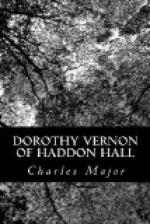While Lady Crawford and Dorothy were revelling in Persian silks, satins, and gold cloths, I sat by Lady Madge and was more than content that we were left to ourselves. My mind, however, was as far from thoughts of gallantry as if she had been a black-veiled nun. I believe I have not told you that I was of the Holy Catholic Faith. My religion, I may say, has always been more nominal and political than spiritual, although there ran through it a strong vein of inherited tendencies and superstitions which were highly colored by contempt for heresy and heretics. I was Catholic by habit. But if I analyzed my supposed religious belief, I found that I had none save a hatred for heresy. Heretics, as a rule, were low-born persons, vulgarly moral, and as I had always thought, despisedly hypocritical. Madge Stanley, however, was a Protestant, and that fact shook the structure of my old mistakes to its foundation, and left me religionless.
After the Persian merchant had packed his bales and departed, Dorothy and Lady Crawford joined Madge and me near the fireplace. Soon Dorothy went over to the window and stood there gazing into the courtyard. After a few minutes Lady Crawford said, “Dorothy, had we not better order Dawson to bring out the horses and coach?” Will Dawson was Sir George’s forester. Lady Crawford repeated her question, but Dorothy was too intently watching the scene in the courtyard to hear. I went over to her, and looking out at the window discovered the object of Dorothy’s rapt attention. There is no need for me to tell you who it was. Irony, as you know, and as I had learned, was harmless against this thick-skinned nymph. Of course I had no authority to scold her, so I laughed. The object of Dorothy’s attention was about to mount his horse. He was drawing on his gauntleted gloves and held between his teeth a cigarro. He certainly presented a handsome figure for the eyes of an ardent girl to rest upon while he stood beneath the window, clothed in a fashionable Paris-made suit of brown, doublet, trunks, and hose. His high-topped boots were polished till they shone, and his broad-rimmed hat, of soft beaver, was surmounted by a flowing plume. Even I, who had no especial taste nor love for masculine beauty, felt my sense of the beautiful strongly moved by the attractive picture my new-found friend presented. His dress, manner, and bearing, polished by the friction of life at a luxurious court, must have appeared god-like to Dorothy. She had never travelled farther from home than Buxton and Derby-town, and had met only the half-rustic men belonging to the surrounding gentry and nobility of Derbyshire, Nottingham, and Stafford. She had met but few even of them, and their lives had been spent chiefly in drinking, hunting, and gambling—accomplishments that do not fine down the texture of a man’s nature or fit him for a lady’s bower. Sir John Manners was a revelation to Dorothy; and she, poor girl, was bewildered and bewitched by him.




